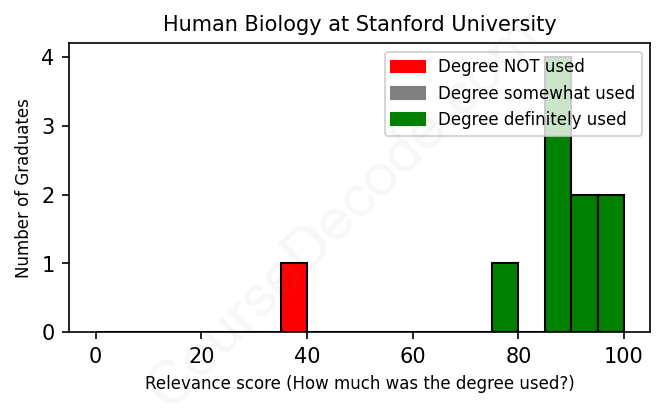
First, some facts. Of the Human Biology graduates from Stanford University we've analyzed , here's how many have used (or NOT used) their degree in their career:

These are estimates based on AI analysis of 10 LinkedIn profiles (see below).
The verdict? Significantly above average. Overall, with an average relevance score of 84%, Human Biology graduates from Stanford University have a much higher likelihood (+17%) of finding work in this field compared to the average graduate across all fields:
And for comparison, here's the chart for all profiles we've looked at across all degrees.
Also, after graduating, 80% of these graduates have pursued further education other than another Bachelor's degree (such as a Masters degree or other), compared to the average across all profiles of 35%. This suggests you may need more than just a Bachelors degree to be competitive as a Human Biology graduate.
See the details:
|
Relevance score: 38% We think this person has NOT gone into a career related to their degree. We think this person has NOT gone into a career related to their degree.
DEGREE INFOGraduated in 2017 from Stanford University with a Bachelor of Arts - BA in Human Biology. Also pursued further education since (see below). JOB HISTORY SINCE GRADUATIONCommunications Coordinator, Cardinal Service, Haas Center for Public Service Stanford University Aug 2017 - Mar 2019 Reporter  Peninsula Press Sep 2019 - Jun 2020 Production Assistant  Reveal from The Center for Investigative Reporting Jun 2020 - Aug 2020 Staff Writer  Half Moon Bay Review Aug 2020 - Mar 2021 Newsroom Fellow  WBUR Jan 2022 - Dec 2022 Associate Producer, Digital  WBUR Jan 2023 - Present FURTHER DEGREES DONE SINCE GRADUATINGMaster of Arts - MAStanford University 2019 - 2020 ABOUTI am a Boston-based reporter and producer, currently working at the WBUR, Boston's NPR station, following a year-long newsroom fellowship. In my not-so-distant past life, I was a staff reporter at the Half Moon Bay Review, where I covered government and public safety.More generally, I am a writer, reporter and researcher excited by the many ways of conveying information that empowers people to make critical decisions. I was brought up first as a print journalist then dabbled in social science research and university communications before returning to journalism. In that time, I became versed in reporting for audio, print and video, while leveraging data, when appropriate, to discover new stories or supplement my reporting. Some favorite stories have focused on the San Francisco Bay Area Peninsulas workforce, including the state of the building trades pipeline and maintenance workers concerns early in the pandemic. My work has also appeared in the Mercury News, KQED, the Peninsula Press, the Sacramento Bee, the Guam Pacific Daily News. |
The top 10 most common jobs done by the graduates we've analyzed (ranked most common to least) are:
From the analysis of LinkedIn profiles, it seems that individuals with a degree in Human Biology from Stanford University often venture into varied fields, but there are some noticeable trends. A significant number of graduates have secured roles in health education, clinical research, and community health initiatives. Positions like Health Educator, Research Associate, Resident Doctor, and Clinical Research Coordinator clearly demonstrate a direct application of their academic background. Many of these jobs leverage their understanding of biological and health concepts, which is at the core of what Human Biology encompasses.
On the flip side, there are also grads who have taken paths that seem a bit detached from their degree. For example, some have pursued careers in law, journalism, and even as communications coordinators, where their Human Biology knowledge doesn't play a central role. While some of these roles may occasionally draw on the critical thinking and ethical frameworks developed during their studies, their daily tasks might involve very little direct relevance to human biology. Overall, while many of the jobs are relevant and utilize their educational foundations, it's clear that graduates are also exploring diverse career paths that don’t always require a deep understanding of human biology.
Here is a visual representation of the most common words in job titles for Human Biology graduates (this is across all Human Biology graduates we've analyzed, not just those who went to Stanford University):

Looking at the career trajectories of Stanford graduates with a degree in Human Biology, it's clear that many find themselves in health or research-related fields soon after graduation. For instance, recent graduates often start off in roles like clinical research coordinators or health educators. Some dip their toes into consulting or even legal positions, though these may stray from the core focus of Human Biology. As we move five to ten years down the line, many of these graduates are deeply embedded in healthcare roles—such as resident doctors or mental health therapists—indicating a strong shift toward applied biological science. Others have made their mark in research or academic settings, contributing to projects that advance our understanding of human health.
However, not everyone stays strictly within the realm of Human Biology. A few graduates pivot toward law, journalism, or even entrepreneurship, suggesting that their education gives them skills that can be applied more broadly. While this can lead to successful and fulfilling careers, it also raises questions about the direct relevance of their degree to their current paths. Overall, it seems most graduates do find meaningful careers that, if not directly tied to Human Biology, at least utilize some of the critical thinking, research skills, and knowledge they gained during their studies at Stanford. So, if you’re considering a degree in Human Biology there, know that it opens various doors—some staying close to the field and others branching out in unexpected ways!
A Bachelor’s degree in Human Biology at Stanford is definitely on the challenging side, even for a prestigious university. You'll dive deep into a mix of biology, physiology, anatomy, and even some ethics, all while balancing intense coursework and lab work. It's not uncommon for students to feel a bit overwhelmed at times, especially since Stanford has super high academic standards and really bright peers. But if you're passionate about the subject and ready to put in the effort, it's also a rewarding experience. Just be prepared for some late nights studying and group projects, because it's definitely not a walk in the park!
Most commonly, in the LinkedIn profiles we've looked at, it takes people 4 years to finish a Bachelor degree in Human Biology.
Looking at these Stanford grads, you can get a pretty good idea of their financial situations based on the jobs they've held. The older ones, especially those in legal or medical careers, seem to be making decent money; for example, the attorney jobs and resident doctor roles generally pay well, especially as they gain more experience. The recent grads are in a mix of roles that range from lower-paying internships and research positions to roles that can lead to higher salaries, like clinical research or consulting. Overall, it seems like many of them will be sitting pretty once they settle into their careers, but early on, especially with internships and entry-level gigs, they might not be raking in the cash just yet.
Here is a visual representation of the most common words seen in the "about" section of LinkedIn profiles who have a Bachelor degree in Human Biology (this is across all Human Biology graduates we've analyzed, not just those who went to Stanford University). This may or may not be useful:

Here are all colleges offering a Bachelor degree in Human Biology (ordered by the average relevance score of their Human Biology graduates, best to worst) where we have analyzed at least 10 of their graduates:
| College | Score | Count |
|---|---|---|
 Indiana University Bloomington Indiana University Bloomington
|
95 | 10 |
 University of California San Diego University of California San Diego
|
89 | 20 |
 UC San Diego UC San Diego
|
89 | 18 |
 University of California, San Diego University of California, San Diego
|
86 | 16 |
 Stanford University Stanford University
|
84 | 10 |
 University of California, Merced University of California, Merced
|
84 | 16 |
 University of Wisconsin-Green Bay University of Wisconsin-Green Bay
|
79 | 10 |
 North Carolina State University North Carolina State University
|
75 | 31 |
 Michigan State University Michigan State University
|
71 | 48 |
 The University of Texas at Austin The University of Texas at Austin
|
69 | 17 |
 University at Albany, SUNY University at Albany, SUNY
|
69 | 15 |
 Hunter College Hunter College
|
60 | 14 |
 University of Southern California University of Southern California
|
58 | 16 |